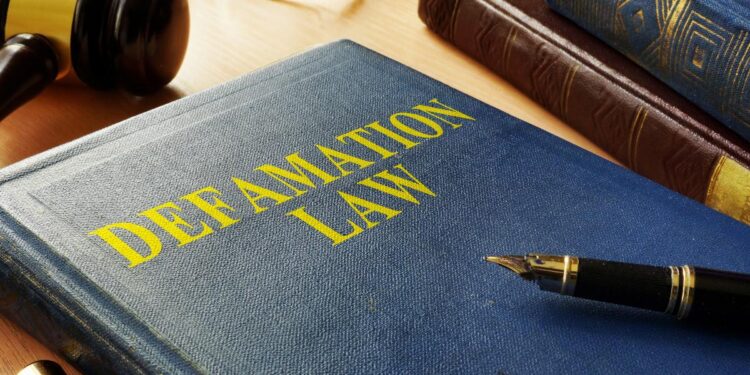Murray Rothbard often shows an unusual ability to counter an objection to something he says by showing that the objection actually supports his view. In this week’s column, I’d like to discuss one example of this. Rothbard believes that libel and slander should not be crimes or torts. If he is right, people shouldn’t be fined or imprisoned for defaming people or be subject to a civil suit for damages resulting from this.
A common objection is that this would allow people to spread lies about others that could severely damage their reputation with complete impunity. To be clear, Rothbard’s position isn’t just that you should be able to say or write what you want about people so long as you believe what you said, or at least think it might be true. He says that there should be no restrictions at all—you can tell lies about people if you choose to do this.
Why does he believe this? His key point is that your reputation is what others think of you, and you don’t own this. You have no right to control what other people think. As he puts it in For a New Liberty:
Another difficult zone is the law of libel and slander. It has generally been held legitimate to restrict freedom of speech if that speech has the effect of either falsely or maliciously damaging the reputation of another person. What the law of libel and slander does, in short, is to argue a “property right” of someone in his own reputation. Yet someone’s “reputation” is not and cannot be “owned” by him, since it is purely a function of the subjective feelings and attitudes held by other people. But since no one can ever truly “own” the mind and attitude of another, this means that no one can literally have a property right in his “reputation.” A person’s reputation fluctuates all the time, in accordance with the attitudes and opinions of the rest of the population. Hence, speech attacking someone cannot be an invasion of his property right and therefore should not be subject to restriction or legal penalty.
Rothbard isn’t saying that it is morally all right to spread lies about people—to the contrary, he regards it as morally wrong—but laws in a libertarian society should conform to the nonaggression principle (NAP), and telling lies about people isn’t aggressing against them.
The objection that elicits his reversal tactic is this. Spreading lies about someone can lead to very bad consequences for the person. Suppose, for example, that an enemy of yours claims with no evidence that you are a child molester. People who hear this might wonder if there is something to it and shun you. Of course, they are within their rights to do this, but your life will take a turn for the worse. If you could sue for defamation, then a person who contemplated spreading the lie would at least have some reason to avoid doing so. Isn’t this restriction on free speech justifiable because of its overall good consequences?
Rothbard’s reversal is to point out that laws against defamation do not just increase the cost of lying about someone. They also penalize perfectly true speech or speech that wasn’t malicious because people can be sued for defamation for whatever they say or write. Even if the suit has little prospect of success, it may still impose costs. This would be especially hard on poor people, who would be inhibited from making any unfavorable comment about someone willing to pay the price to sue them. Rothbard explains:
The law of libel, of course, discriminates in this way against the poor, since a person with few financial resources is scarcely as ready to carry on a costly libel suit as a person of affluent means. Furthermore, wealthy people can now use the libel laws as a club against poorer persons, restricting perfectly legitimate charges and utterances under the threat of suing their poorer enemies for libel. Paradoxically, then, a person of limited resources is more apt to suffer from libel—and to have his own speech restricted—in the present system than he would in a world without any laws against libel or defamation.
But what about the person harmed by deliberate lies? Rothbard counters that in the legal system he favors, people would be less inclined than at present to believe such rumors:
Furthermore, pragmatically, if there were no laws of libel or slander, people would be much less willing to credit charges without full documentation than they are now. Nowadays, if a man is charged with some flaw or misdeed, the general reaction is to believe it, since if the charge were false, “Why doesn’t he sue for libel?”
Additionally, in Rothbard’s system, if someone lied about you, you would be free to lie about them; and if you refrain from doing so because it is wrong, others less scrupulous may act in your place. This would also serve as a deterrent.
One general point about the way Rothbard argues is important to bear in mind. Some people mistakenly think that libertarians should talk about nothing but rights when explaining their views on disputed issues (I don’t want to libel anybody, so I won’t name names). But this is not so; the fact that libertarian rights have good consequences is also significant. If it were to turn out—libertarian rights don’t have good consequences, then we would have to stick with what libertarian rights require. We are fortunate that respecting rights usually has better consequences than failing to do so, but Rothbard says, “Utilitarian considerations must always be subordinate to the requirements of justice.”
I’m especially glad to be able to point to an insight from For a New Liberty, which is celebrating its fiftieth anniversary. Murray’s keenness in argument continues to inspire us decades later.















